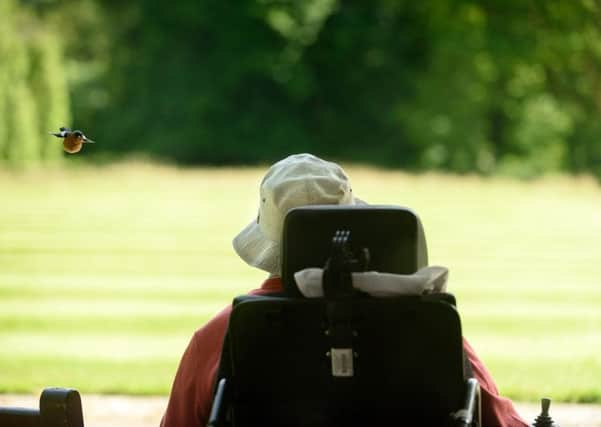Becky Everett: Loneliness and isolation as bad for health as smoking


This is one of those facts that you struggle to make sense of when you hear it. It throws up so many questions, not least how it is possible in the UK in 2018 for this to happen? How can people feel so alone and disconnected from their fellow human beings that it can have such a devastating impact?
Such is the scale of the problem that the Scottish Government is developing a national strategy on loneliness and social isolation – one of the first in the world.
Advertisement
Hide AdAdvertisement
Hide AdKnown to affect hundreds of thousands of people of all ages, backgrounds and stages of life, feeling lonely and isolated is proven to lead to a wide range of serious physical and mental health issues. It is associated with an increased risk of developing coronary heart disease, stroke, high blood pressure, cognitive decline, depression and suicide. It can also increase the likelihood of older people developing clinical dementia.


A range of factors are seen as putting us at greater risk, including major life transitions, such as bereavement, divorce, redundancy and retirement, as well as long term health conditions.
The latter has a particular resonance for my team and I, working at Leuchie House, Scotland’s dedicated respite centre for people with long term conditions. People with disabilities and those who care for them are two of the groups at greatest risk of both loneliness and social isolation.
Many of those who come for short respite breaks to Leuchie House are aged over 60 and their conditions are at an advanced stage. As long term conditions progress, it is inevitable that social isolation does too. Opportunities to get out of the house, to socialise, to maintain hobbies and interests, and to retain your sense of independence all decline as your health deteriorates. Research by Sense, the charity representing people with communication support needs, has revealed that up to 50 per cent of disabled people will be lonely on any given day.
For people with long term conditions who live alone, the situation is particularly concerning. For many, their only regular contact with other people is with the care staff who come in to carry out personal care at set points in the day, always working within tight time limits that leave little time for socialising. This lack of social contact is likely to be exacerbated by a feeling of having only limited control and personal choice over basic everyday decisions. If, for example, the time you get up and go to bed is determined by care staff rotas, it’s no wonder you can feel cut-off, disempowered and that you’ve lost your independence.


For those people with long term conditions whose main carer is a spouse or member of the family, it’s likely these feelings are shared with them. According to the results of a recent survey by Carers UK, 8 out of 10 carers taking part felt lonely or socially isolated as a result of their caring role, due to limited opportunities to take part in social activities or even leave the house.
When you find yourself in a caring role, it can become all-consuming and impact upon every aspect of your life. It can affect your relationships with family and friends, your ability to work, your health and your sense of identity, often leaving you at breaking point. Even if you manage to find some time for yourself, many carers talk about feeling guilty, selfish or anxious at focusing on themselves rather than their loved one.
It is significant that more than half the carers taking part in this survey said regular breaks from their caring role would make a difference in reducing their loneliness. At Leuchie we see on a daily basis the transformational impact short breaks can have.
Advertisement
Hide AdAdvertisement
Hide AdUnsurprisingly it can often be the social side which has the biggest impact on our guests’ health and wellbeing. A chance to chat, meet new people, share experiences, have a laugh and enjoy a meal with others are all simple pleasures that can make us feel involved and reconnected again. Add to that the renewed sense of independence that comes with being able to make all your own decisions again and it’s easy to see why we often describe our guests as ‘shining bright’ at the end of their respite breaks.
Our focus at Leuchie is always on ensuring that the impact of every break lasts long after our guests go home. Creating formal links between respite services and local community befriending schemes could go a long way to maintaining a ‘Leuchie effect’ between breaks.
So we welcome wholeheartedly the government’s plans for a national strategy on loneliness and social isolation. As the consultation process moves forward we urge them to listen to what two of the groups most at risk are saying loud and clear. Short respite breaks can make a life-changing difference to people with long term conditions and their carers.
The health and wellbeing benefits are enormous. The ability for breaks to prevent the need for acute care are well documented. The social impact is clear. Surely these are all outcomes that should be high on Scotland’s agenda for tackling loneliness and social isolation?
Becky Everett, Head of Operations, Leuchie House